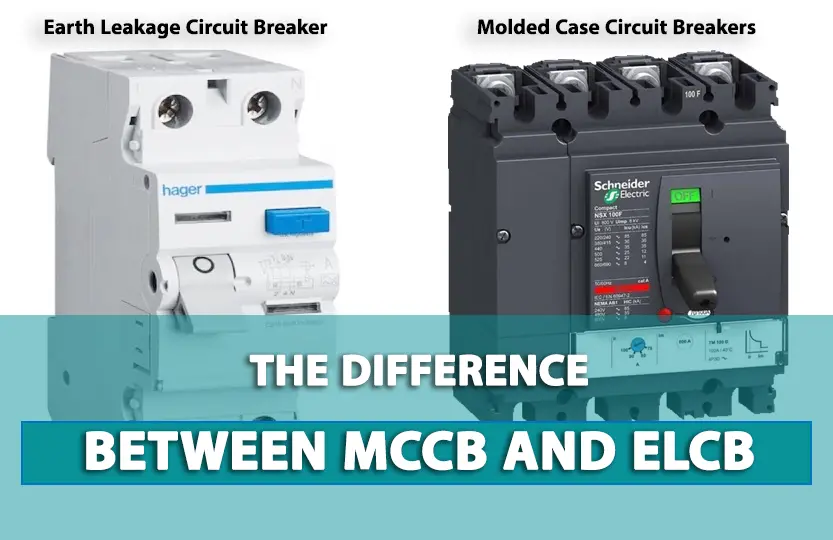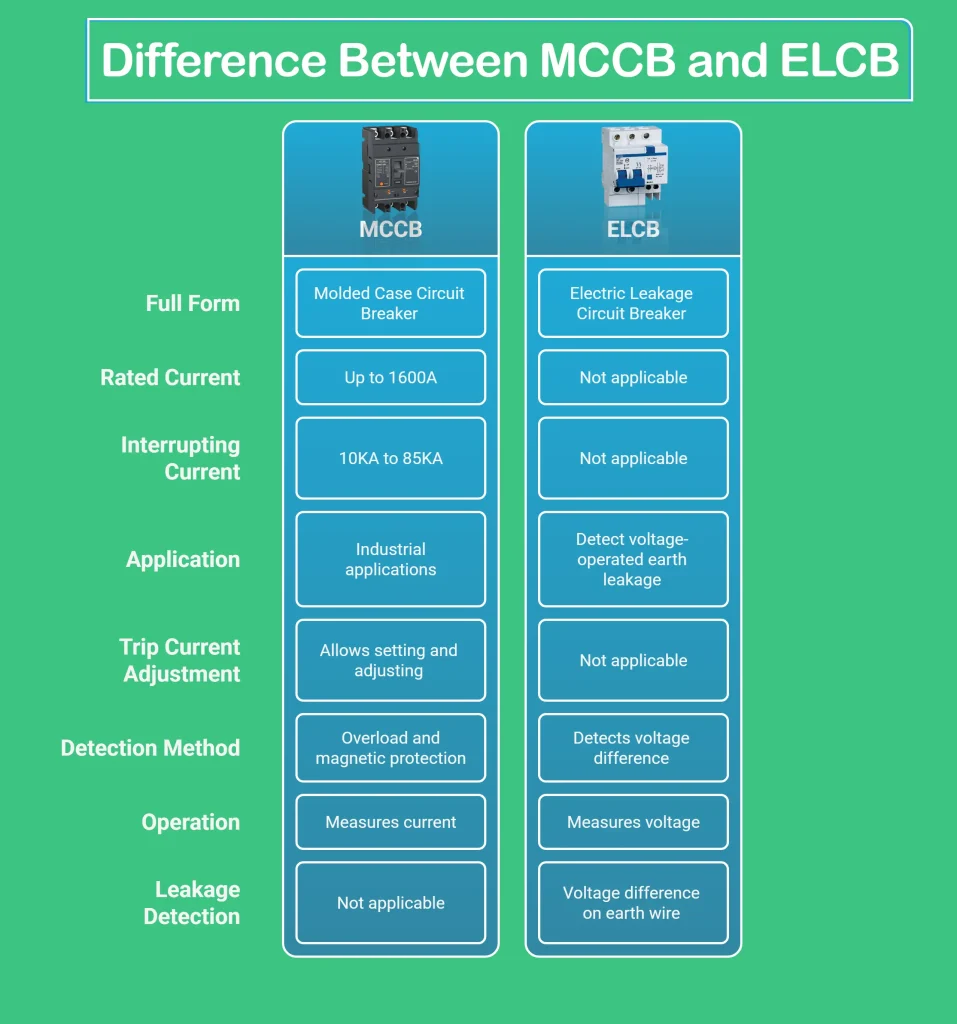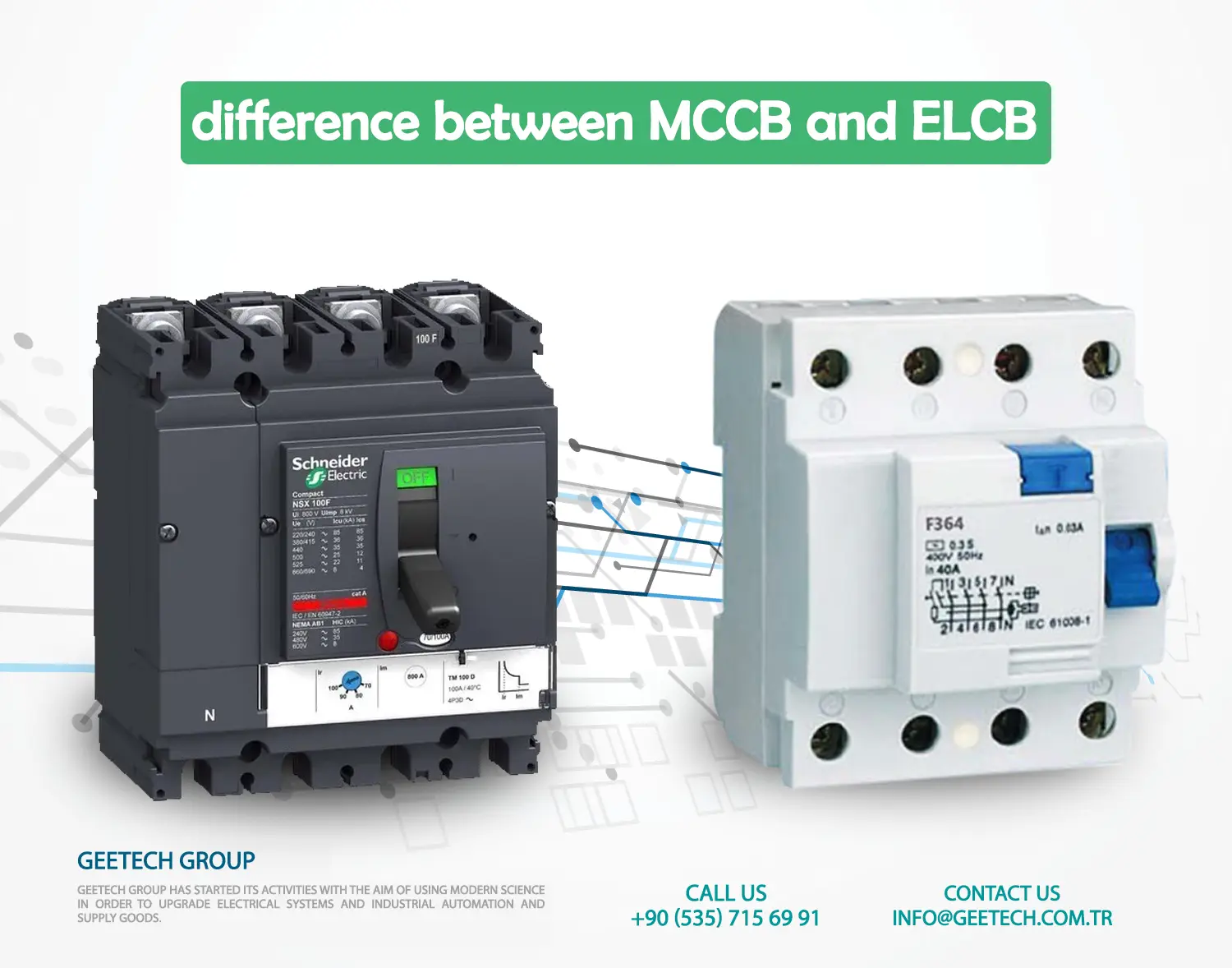
Are you confused about the difference between MCCB and ELCB in electrical systems? This article will provide you with a comprehensive comparison of these two important components to help you understand their functions and applications better.

What is MCCB?
MCCB, short for Molded Case Circuit Breaker, is a crucial electrical safeguard utilized when the current load surpasses a miniature circuit breaker’s capacity. This protective device offers defense against overload, short circuits and serves for circuit switching purposes as well.
Unlike miniature circuit breakers, MCCBs can handle higher current ratings and fault levels, making them suitable even for residential applications. With its varied current ratings and superior breaking capacity, MCCBs are particularly utilized in industrial settings.
These robust devices are ideal for safeguarding capacitor banks, ensuring generator protection, and managing main electric feeder distribution. MCCBs are well-suited for situations requiring discrimination, adjustable overload settings, or earth fault protection, offering reliable protection for a wide range of applications.

- MCCBs are more suitable for higher current applications compared to Miniature Circuit Breakers (MCBs).
- They have adjustable trip settings for different current ratings, making them versatile for various electrical load requirements.
- MCCBs are commonly used in industrial settings, commercial buildings, and larger residential properties.
Read More :
What is ELCB?
ELCB stands for Earth Leakage Circuit Breaker. It is a safety device used in electrical installations to prevent electric shock by detecting small leakage currents to the ground and disconnecting the power supply.
ELCBs are designed to detect imbalances in the electrical current flowing through the circuit due to faults such as insulation failure or accidental contact with live parts.
They help protect individuals from electric shock and prevent electrical fires caused by faulty appliances or wiring. ELCBs are essential components in ensuring electrical safety in both residential and industrial settings.
- ELCBs are specifically designed to protect against electric shock caused by faulty appliances or wiring.
- They are sensitive to even small leakage currents and can quickly interrupt the circuit to prevent electrical hazards.
- ELCBs are commonly used in residential properties, especially in areas where there is a higher risk of electric shock.

Difference Between MCCB and ELCB
1. Function
- MCCBs protect against overcurrent and short circuits, while ELCBs protect against electric shock due to leakage currents.
- MCCBs are designed to protect electrical equipment, while ELCBs are designed to protect individuals from electric shock.
- While MCCBs are more common in industrial and commercial settings, ELCBs are more commonly used in residential properties.
2. Operation
- MCCBs detect overcurrent and short circuits through thermal or magnetic tripping mechanisms.
- ELCBs detect leakage currents by comparing the incoming and outgoing currents in the circuit.
- MCCBs trip when there is an overload or short circuit, while ELCBs trip when there is a leakage current.
3. Applications
- MCCBs are used in applications where overcurrent protection is essential, such as industrial machinery and large electrical systems.
- ELCBs are used in residential properties, especially in bathrooms, kitchens, and other wet areas where there is a higher risk of electric shock.
- In some cases, both MCCBs and ELCBs are used together for comprehensive protection against electrical hazards.
| Sl.No | MCCB (Molded Case Circuit Breaker) | ELCB (Electric Leakage Circuit Breaker) |
|---|---|---|
| 01 | MCCB stands for Molded Case Circuit Breaker. | ELCB stands for Electric Leakage Circuit Breaker. |
| 02 | Rated current can go up to 1600A. | ELCB detects voltage-operated earth leakage. |
| 03 | Interrupting current ranges from 10KA to 85KA. | It identifies current leakage by detecting voltage difference on the earth wire. |
| 04 | MCCB is used for both low and high breaking capacity, mainly in industrial applications. | ELCB operates by measuring the voltage on the earth conductor to detect leakage. |
| 05 | MCCB allows setting and adjusting the trip current for overload and magnetic protection. | ELCB can only detect leakage when the voltage difference is present on the earth wire. |
In conclusion, while both MCCBs and ELCBs are essential components of electrical systems, they serve different purposes and provide unique forms of protection. Understanding the differences between MCCB and ELCB will help you make informed decisions when designing electrical systems or troubleshooting electrical issues in your property.
Remember, safety should always be the top priority when dealing with electricity. If you are unsure about the installation or maintenance of MCCBs or ELCBs, always consult a qualified electrician for assistance.



















